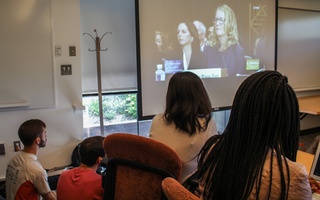{shortcode-d1ad6cdfcae17eec2e64711c2af47458ca8255a6}
Students and alumni of Harvard Law School appear to be divided over the nomination of Judge Brett M. Kavanaugh to the United States Supreme Court.
Students at the school, where Kavanaugh taught as a visiting professor for many years, have circulated two contrasting letters in recent weeks — one praising Kavanaugh’s character and another opposing his nomination.
Before he was a Supreme Court nominee, Kavanaugh spent recent years teaching Harvard Law students about the court he is likely about to join. President Donald Trump nominated Kavanaugh, now a judge on the D.C.-based federal appeals court, for the country’s highest court last month. The U.S. Senate must now confirm Kavanaugh before he can take a seat on the bench.
Less than two weeks ago, a group of his former students sent a letter to the Senate Judiciary Committee praising Kavanaugh’s presence in the classroom, calling him “a rigorous thinker, a devoted teacher, and a gracious person.”
The letter focused solely on Kavanaugh’s character during his time spent teaching at the Law School and did not explicitly recommend that the Senate confirm him.
Eighty former and current students of Kavanaugh signed the letter.
But this week, former and current Law School students are speaking out against his nomination in a different letter.
More than 200 current and former Harvard Law School students have signed the open letter, which is addressed to Law School Dean John F. Manning ‘82 and the “Harvard Law School leadership.”
That letter came in response to the original letter praising Kavanaugh.
“While a small group of HLS students expressed their personal admiration for Judge Kavanaugh’s teaching abilities, we wish to make it known that many members of the Harvard community staunchly oppose his nomination to the most powerful bench in the country” the letter stated.
Haley Adams, a signatory of the letter opposing Kavanaugh’s nomination, wrote in an email Wednesday that the purpose of the letter was to show that a “large portion” of the Law School community did not support the nomination of Kavanaugh to the Supreme Court.
“The letter was meant to make it clear that a large portion of HLS did not feel represented by the administration's celebration of Kavanaugh's nomination, nor by the students who spoke out lauding his teaching style,” Adams wrote.
“We wanted to make it clear that a much larger portion of the HLS community does not believe that increased proximity to power or institutional prestige should outweigh the extreme harm that a Justice Kavanaugh would cause,” she added.
In an interview last month prior to the release of the critical open letter, former law student Colleen Roh Sinzdak praised Kavanaugh’s accessibility at the Law School.
“He was very, very available for students during office hours and things. He would basically be in his office after class every day and he’d encourage people to come by and talk to him and meet with him,” Roh Sinzdak said.
Roh Sinzdak is one of the organizers of the letter authored by former students of Kavanaugh and could not immediately be reached for comment regarding the critical open letter.
At the Law School, Kavanaugh has taught a course on the separation of powers from 2008 to 2015 and one on the Supreme Court starting 2014.
Manning congratulated Kavanaugh and thanked him for his “superb teaching” at the Law School in a statement posted on the Law School’s website after Kavanaugh’s nomination.
“As the Williston Lecturer on Law, he has brought rigor and openness to his ever-popular courses on Separation of Powers and the Supreme Court,” Manning said.
Manning declined to comment on the open letter.
If Kavanaugh is confirmed by the Senate, every justice on the Supreme Court would have attended Harvard or Yale Law School; Kavanaugh’s J.D. from Yale would take the place of Kennedy’s law degree from Harvard.
—Staff writer Aidan F. Ryan can be reached at aidan.ryan@thecrimson.com. Follow him on Twitter @AidanRyanNH.
Read more in News
In First, Four Harvard Schools to be Led by Black WomenRecommended Articles
-
 Supreme Court Nominee Maintains Close Harvard Ties
Supreme Court Nominee Maintains Close Harvard Ties -
 Law School Alumni Call for Improved Loan Assistance
Law School Alumni Call for Improved Loan Assistance -
Chief Justice Roberts Returns to Law School for Moot Court FinalU.S. Supreme Court Chief Justice John G. Roberts ’76 returned to the Law School Tuesday night to preside over the final round of the Ames Moot Court Competition.
-
 A Well-Worn Path: Navigating the Road to Judicial Clerkships
A Well-Worn Path: Navigating the Road to Judicial Clerkships -
 It’s a Job Interview, Not a Trial
It’s a Job Interview, Not a Trial













